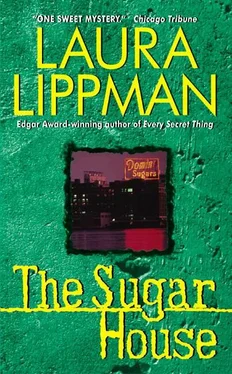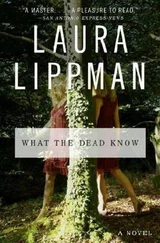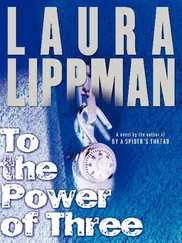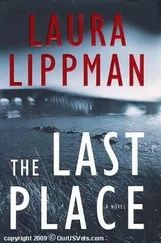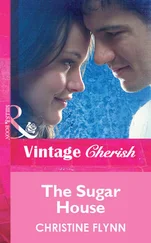“Damn, now I’ll have to double back.”
“It’s eight-fifteen,” Crow said. “We’re supposed to meet Whitney in fifteen minutes.” He sounded worried. Whitney scared Crow a little. Whitney scared almost everyone, except Tess.
“She’s always late.”
“She’s always late, except when we’re late, and then she gives us unmitigated shit.”
“Let me try one more approach into Hampden, this time from the north.” Tess had a peculiar vanity about her ability to find shortcuts and new routes through her hometown. They had set out to see the lights in Hampden, and she would not be denied.
They were in Baltimore ’s richest precincts now, Guilford and Roland Park, where the homes were decadently large and the tax bills were a kind of status symbol. Look, the houses seem to proclaim, we’re paying $12,000 a year in property taxes and we still send our kids to private schools! These rambling mansions filled Tess with loathing-and yearning. One stone house had stood empty for years, neglected and haunted looking, until an exasperated neighbor purchased it to protect his property values. She could never forget that story, never stop marveling at the idea that some people bought houses the way she bought sweaters at The Gap.
The truth was, she often thought long and hard about that second sweater.
“What’s up there?” Crow said, pointing to a side street after she turned onto Cold Spring Lane.
“More rich people, I suppose.”
“No, these houses look much smaller. Turn up there, Tess. I’ve never noticed this neighborhood before.”
“But the lights-”
“They’ll be there for the rest of the month. We’re here, right now. Besides, you promised you were going to be more spontaneous, remember?”
She remembered no such promise. But it did seem unlikely they would make it to 34th Street with enough time left to take in the full spectacle, so she headed up the dark road. A few modest strings of Christmas lights illuminated the hodgepodge of houses. There were semi-shabby shingle-sided affairs, old farmhouses and duplexes. Semi-detatched as they were known in Baltimore. Tess always thought this would make a good term for relationships as well. Not hers, though. She and Crow were semi-attached-together, joined at the hip, and other body parts as well. She had lost him once, through carelessness and stupidity. She couldn’t quite say to him, forever and ever, but she could and did forswear stupidity.
“There’s a meadow back there, and a park. You’d hardly know you’re in Baltimore proper at all,” Crow said. Tess didn’t point out they could still hear the traffic on Cold Spring. “What is this place?”
“Evergreen.” She wasn’t sure how she knew the name, but she was confident of it from the moment she said it. “These duplexes-this is where the people who built the big houses in Roland Park lived during the construction.”
“Designed by Frederick Law Olmsted,” Crow said solemnly. Facts were serious, sacred things to Crow, but then-he had never been a reporter. “Roland Park had the first shopping center in the United States.”
“I know, I read the historic marker outside the old Baskin Robbins, too.”
“Let’s bring Esskay up to run in that meadow,” Crow said. “When spring comes. We could bring a picnic, explore the woods over there.”
“It’s not even winter yet, and you’re talking about spring. Don’t get so far ahead of yourself. That’s what you promised, remember? One day at a time.”
“Do you think,” Crow said with the smallest of sighs, “that the AA motto is really appropriate for a relationship?”
She turned into a narrow lane, thinking it was an alley, but houses hugged the hillside here. Most were large, the legacy of Baltimore ’s Catholic roots. Tess had grown up among people who had five children, eight, ten, even thirteen. Now her friends who had three children seemed vaguely apologetic.
But there were some small cottages here, too, tucked among the rambling old Victorians. It reminded her of the Black Forest, not that she had ever seen the Black Forest. But she had been raised on Grimm’s, the real Grimm’s, where Cinderella’s stepsisters mutilated their feet to get into that glass slipper, and a father cut off his daughter’s hands and breasts out of pure spite.
The words Black Forest made her think of cake, which made her realize how hungry she was. Time for dinner.
Whitney Talbot had already been seated at their table in the Ambassador, a once fusty restaurant that had found a new, improbable second life as a lushly appointed Indian restaurant. Her face was turned away from the door, but Tess knew her by the long, sharp bones poking through her winter white pantsuit, the arrogant lift of her head. Really, Tess thought, all she needed was a pith helmet to complete the illusion that she was on the veranda of a grand old Calcutta hotel, snapping her fingers impatiently for another gin rickey.
“Don’t tell me,” Whitney said in the clear, ringing tones of a Baltimore valley girl. “You were dressed and ready to go, then took one look at each other and ripped one another’s clothes off, carried away by the passion of your rediscovered love.”
“Not at all,” Tess muttered, blushing, in part because Whitney’s voice carried so well and in part because she was not far wrong.
“Hi, Whitney,” Crow said, taking the seat farthest from her. “How’s the job hunt?”
“I’m not on a ‘job hunt,’” she corrected, lifting her chin higher still. “I’m trying to decide what I want to do with my life. My future vocation is just one element of my quest, and probably the easiest to solve. The Beacon-Light has already offered me my old position, but I don’t want to write editorials anymore. I seem to have run out of opinions.”
Tess almost snorted water through her nose. “That’ll be the day. But I am surprised they wanted you back, given the way you left.” Whitney had quit the paper under a cloud, although the only thing she had ever done wrong was save Tess’s life. It turned out there had been an office pool, and one of the clerks made $200 for having Whitney as the “one most likely to go postal.” Terribly unfair and not at all accurate, but what could one do?
“New management,” Whitney said airily. “The five top editors aren’t even sure who Spiro Agnew was, and his past is much more accessible than mine.”
“Didn’t they keep your personnel file?”
“Shredded. My mother’s lawyer made a call.”
Tess looked fondly at her old friend. It’s a rare person who can get away with the sentence, “My mother’s lawyer made a call.”
“Well, I’m on a job hunt,” Crow said cheerfully. “Shockingly, a degree from the Maryland Institute, College of Art is not a hot commodity on the market. So Tess is the only one of us who’s gainfully employed.”
“Gainfully might be stretching it, but I do have some work. Interesting work at that.”
“Details?” Whitney pressed.
“Confidential, dearest. You know that.”
“Of course. Why else would I care? Besides, maybe this is what I was meant to do with my life. We can be Starsky and Hutch. It goes without saying that I’ll be the tall blond one.”
“Wasn’t he the wife beater?” Tess asked. “Which would be forgivable, since he got counseling, but he also sang that awful, awful pop song. The one where he rhymed ‘reminiscing’ with ‘kissing.’ Hutch was really much sexier.”
“Does this scenario make me Huggy Bear?” Crow wondered. Ah, Nick at Nite and TV Land, Tess thought, our true universal language.
“Can’t you tell me anything?” Whitney asked.
“I can tell you it’s a Jane Doe case. I’m trying to identify a dead girl, a homicide victim. Hey, why is it Jane Doe? Or John Doe? How did that usage enter the language?”
Читать дальше
